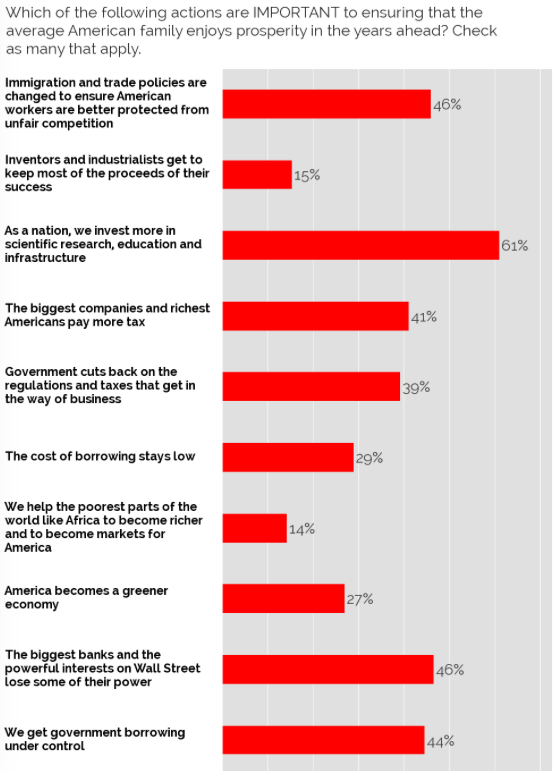Invest more in schools, science and infrastructure.
Change trade and immigration policies so that American workers are better protected from unfair competition.
Reduce the power of the big banks and Wall Street.
Among YouGov’s First Verdict panel, those three interventions are the most supported policy actions for ensuring that the average American family enjoys prosperity in the years to come. They suggest a thirst for bigger government intervention from US voters – a thirst that the likeliest two presidential nominees, Clinton and Trump, are both tapping into. As Ryan Bourne wrote last week on CapX; the election is set to be a “choice between two strands of interventionism: a bully boy mercantilist and a managerialist who believes we are only one expert or regulation away from prosperity”.
As you can see from the chart below interventionism wins three times over:
- More investment spending beats getting borrowing under control by 61% to 44%…
- Getting the richest to pay more tax beats allowing investors and innovators to keep most of the proceeds of their success by 41% to 15%…
- Amore protectionist trade policy beats opening up markets in Africa by 46% to 14%.
39% do think that cutting back red tape and taxes are important to helping average families but the overall preference is for more intervention, rather than less.

David Brooks calls on the Republicans to rethink their attitude towards government in his latest column for the New York Times. Concluding an anti-Ted Cruz column, Mr Brooks writes: “Since Goldwater/Reagan, the G.O.P. has been governed by a free-market, anti-government philosophy. But over the ensuing decades new problems have emerged. First, the economy has gotten crueler. Technology is displacing workers and globalization is dampening wages. Second, the social structure has atomized and frayed, especially among the less educated. Third, demography is shifting. Orthodox Republicans, seeing no positive role for government, have had no affirmative agenda to help people deal with these new problems. Occasionally some conservative policy mavens have proposed such an agenda — anti-poverty programs, human capital policies, wage subsidies and the like — but the proposals were killed, usually in the House, by the anti-government crowd.” The full column is here.
For more about Portrait of America and the methodology behind First Verdict, click here.For the complete Portrait of America catalog, click here.


